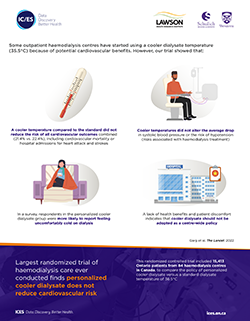Largest trial ever done in hemodialysis care examines optimal dialysis temperature

By Lawson Health Research Institute
Findings from a new trial embedded into existing care provided by Ontario’s hemodialysis centres suggest that lowering dialysis temperatures does not lead to improved patient outcomes, despite previous studies suggesting otherwise.
Published in the Lancet, the four-year trial of more than 15,000 patients was done in 84 of 97 hemodialysis centres in Ontario, and, in terms of the number of patients, it was the largest hemodialysis trial ever published worldwide. The study was done through Lawson Health Research Institute (Lawson), ICES Western and Schulich School of Medicine & Dentistry at Western University.
The standard temperature for dialysis – a life-sustaining treatment for patients with kidney failure – is approximately 36.5 degrees Celsius, which is similar to a human’s body temperature. But over the past several years, there have been small studies suggesting that cooler dialysis temperatures could reduce the risk of cardiovascular-related deaths and hospitalizations and better maintain blood pressures during hemodialysis treatments.
 ICES Data Discovery Better Health Infographic
ICES Data Discovery Better Health Infographic
(Click image to view full-size version)
“Previous studies have been limited, especially in numbers, yet the practice of lowering the dialysate temperature has grown in popularity,” says Dr. Amit Garg, Lawson Scientist, Site Director for ICES Western and Associate Dean of Clinical Research at Schulich Medicine. “We wanted to determine if lowering the dialysate temperature would help people live longer and healthier, so we collected high-quality evidence to make sure we’re doing the right thing for patients, including measuring symptoms and how people felt on the dialysis.”
Over the course of the trial, the research team examined outcomes of both standard and cooler dialysis treatments – more than 4.3 million in total – integrated into routine care delivery and making use of the data automatically collected during the course of treatment.
Hemodialysis centres were randomized to provide dialysis using dialysate set at either the standard temperature or a lowered temperature of 0.5 degrees Celsius to 0.9 degrees Celsius below each patient’s measured pre-dialysis body temperature, with a lowest recommended temperature of 35.5 degrees Celsius.
“We did not see any benefits to patients who had the lowered temperature and no improvements to cardiovascular health. Some patients experienced discomfort from the lower dialysis temperature,” says Garg. “The results suggest we should not be adopting lower dialysate temperatures as a centre-wide policy, and its utility in select patient care warrants scrutiny.”
New trial methodology
This study is an example of a pragmatic trial, which is designed to streamline the clinical trials process for appropriate interventions, making it easier and more cost-effective for researchers to test potential health innovations and treatments.
Led by Garg, the Accelerating Randomized Trials (ART) Platform aims to equip researchers with streamlined tools, advice and experience to facilitate efficient trials for new therapies, treatment options and medical innovations.
“Clinical trials can be very costly, complex and challenging to run, which can mean significant delays in bringing potential new treatments and therapies to market,” says Garg. “Through our platform, we can help researchers – from Schulich and beyond – design and run trials that are efficient, safe, cost-effective and streamlined.”
Large-scale pragmatic trials – like the MyTemp trial led by Garg – test simple, scalable, and sustainable interventions in a real-world, day-to-day, clinical care setting. Such trials allow all patients who receive care in that setting to be included in the trial. As a result, many patients who are excluded from traditional trials are included in pragmatic trials, leading to findings that accurately reflect the intervention’s impact in real-world settings and on real-world populations.
“Through our Pragmatic Trials Stream, we will support the conduct of more large-scale trials to efficiently identify treatments that can improve the outcomes and healthcare of patients. Much like we did here, we can integrate these trials into routine healthcare and use existing data sources to track trial outcomes,” said Garg. “Done well, these trials yield valid and highly generalizable results, faster than traditional trials and at a fraction of the cost by testing solutions which are simple, scalable, and sustainable.”
For further information on the Pragmatic Trials Stream, or to discuss your ideas for a pragmatic trial, please contact research@schulich.uwo.ca.
The findings were presented by Garg at the American Society of Nephrology conference in Orlando, Florida on Friday Nov 4th @ 11:45 am EST.








